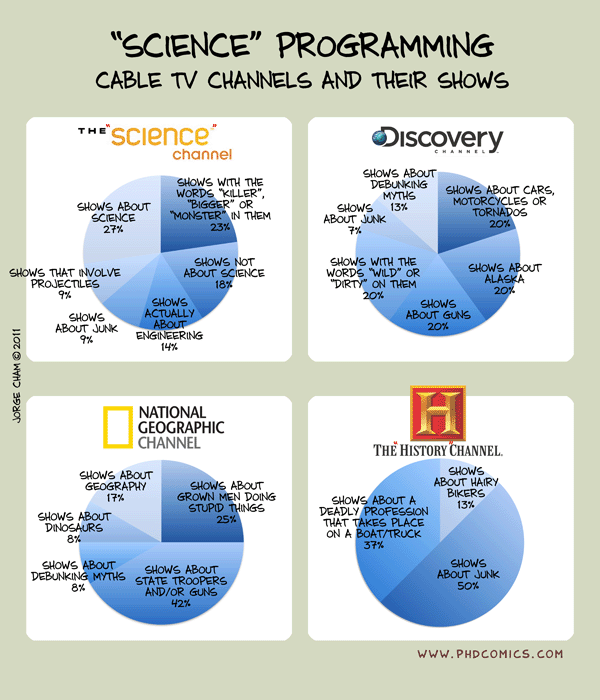 It is at this point a lamentable mantra among those interested in getting good science to the masses: the science on TV sucks. Some gems stick out (Mythbusters, How the Universe Works, NOVA), but no matter how much they gleam, they are tarnished by a smothering array of nonsense (Dr. Oz, Mermaids: The Body Found, Ghost Hunters, Ancient Aliens, etc.).
It is at this point a lamentable mantra among those interested in getting good science to the masses: the science on TV sucks. Some gems stick out (Mythbusters, How the Universe Works, NOVA), but no matter how much they gleam, they are tarnished by a smothering array of nonsense (Dr. Oz, Mermaids: The Body Found, Ghost Hunters, Ancient Aliens, etc.).
It's a surprise to see any critical or skeptical takes on television, and when we do it is indeed a small victory (Steve Novella in the land of Oz, Nightline’s Beyond Belief). But these are rare. Most of the time we bang our heads against the wall (more like fingers against the keyboard) in protest of the latest nonsense filling the airwaves.
“No BoBo, having your buddy walk across a highway ‘like a Bigfoot’ does not prove that the old rancher indeed saw one.”
Skeptic colleague Sara Mayhew and I watching Ancient Aliens. That's my WTF face.
Lovers of science and rationality suffer credulous (and sometimes downright unethical, e.g., Psychic Kids) television in silence. We take to Facebook and Twitter and numerous blogs, firing reason-tipped shells. However, the enemy, television's disregard for proper criticism or scientific accuracy, feels but the impact of doomed flies on an already dirty windshield. What do we do?
Change the channel.
The main battlefield has relocated to cyberspace. A recent development, the Internet is now the public’s main source of information. On this ground, science can fight at its true weight class. A Bigfoot/UFO/ghost site languishes under the obscurity of a measly Internet imprint. Its lack of wide appeal is compounded by an Angelfire-esque layout and green text on a black background evoking the '90s. Meanwhile, a biology professor from Minnesota can assert the scientific position to an audience of 25 million a year (according to Myers himself).
Though there is surely more bunk than can be shot through on the Internet, the playing field is more level there. A re-focus of efforts is in order. [To this end, fellow JREF Fellow Tim Farley has an excellent talk on the future of skepticism on the Internet from last summer's Amaz!ng Meeting.] To make sure Wikipedia adequately describes the "witchcraft" notions of homeopathy to the millions likely to end up there is far more practical than trying to get a TV show to assert the same position, for example.
My suggestion hinges on the fact that people rush to Google, not the History Channel, for information. A passive absorption of the "ancient aliens" hypothesis (I use that term begrudgingly) can be reinforced or discarded by a main information source. If people are to check sources, let's focus on the ones we can make sure are there and sufficient. People who don't have any interest in verification are as out of reach as anyone (you can't keep people from watching TV). In this view we can only hope the whiff of "for entertainment purposes only" is stronger on television than it is online.
Without a stronger presence on television, a continued struggle against crappy science on TV is futile. It's what people want. Magic and mysticism are genuinely interesting, though bereft of empirical support. Ultimately, most producers will make what the majority of people want, and the majority of people are fine with the superficial account, the eyewitness testimony, and the emotionally laden anecdote. Even in book publishing this is an issue. UK psychologist Richard Wiseman could not find a publisher for his book "Paranormailty" in the US because publishers didn't think skepticism would sell. Weird sells.
 Of course, generous and science-based individuals are trying to change the landscape of science television. Most notably, Seth MacFarlane and Neil deGrasse Tyson are updating and reimagining Carl Sagan's Cosmos for Fox in 2014. And niche television channels can support more nuanced content that would be rejected by the masses. For instance, Morgan Freeman satisfies his own scientific curiosity by hosting "Through the Wormhole" on The Science Channel. But again, the pie chart showing how much good science is on TV is stamped with an impression of a big foot.
Of course, generous and science-based individuals are trying to change the landscape of science television. Most notably, Seth MacFarlane and Neil deGrasse Tyson are updating and reimagining Carl Sagan's Cosmos for Fox in 2014. And niche television channels can support more nuanced content that would be rejected by the masses. For instance, Morgan Freeman satisfies his own scientific curiosity by hosting "Through the Wormhole" on The Science Channel. But again, the pie chart showing how much good science is on TV is stamped with an impression of a big foot.
The Internet is now the center of town at noon, where facts live and die by hair-triggered "send" buttons. It has the most potential for innovation in science communication, and to grab the youth by their wonder-filled ears and say, "Isn't the universe amazing!?" [A good example of this innovation is the recent collaboration between the Chris Hardwick and Neil deGrasse Tyson to bring Neil's show, Star Talk Radio, to life as a web series.]
For information, television is undoubtedly important, but of waning importance. With a rigorous contingent of science advocacy forming online (XKCD, Minute Physics, on Reddit, on Twitter, etc.) and certainly more to come, a priority shift must be supported.
So with a new episode of Ancient Aliens airing soon, I say sit back, relax, and enjoy the show.
Kyle Hill is the JREF research fellow specializing in communication research and human information processing. He writes daily at the Science-Based Life blog and you can follow him on Twitter here.
